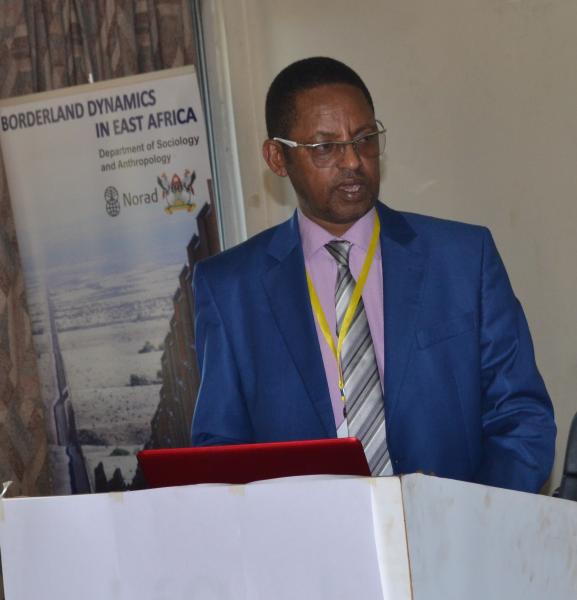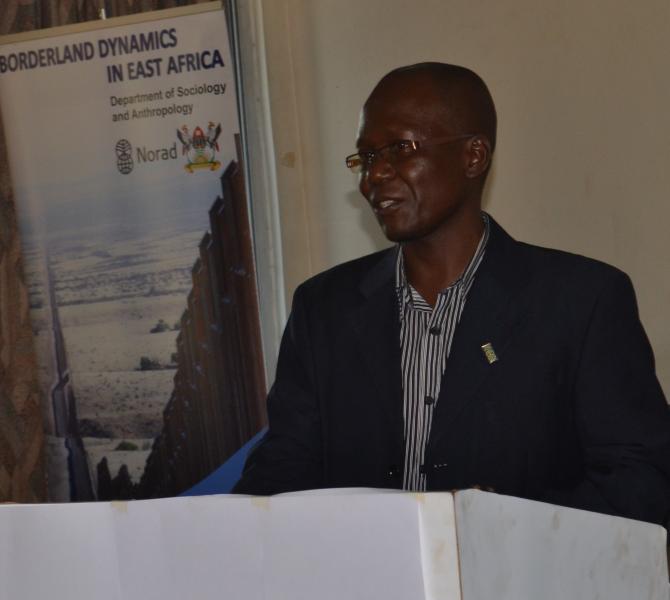
The Department of Sociology and Anthropology, Makerere University is hosting a four-day refresher training for supervisors of graduate students on the Borderlands Project. The training is underway in Senate Conference  Hall with over 20 participants from the University of Addis Ababa, University of Khartoum and Makerere University.
Hall with over 20 participants from the University of Addis Ababa, University of Khartoum and Makerere University.
Facilitators include Prof. Leif Manger from the University of Bergen; Prof. Munzoul Assal from the University of Khartoum, also NORHED Coordinator; Prof. Paschal Mihyo; Prof. Herman Musahara, OSSREA Executive Director; Prof. Buyinza Mukadhasi, Director, Makerere University Diectorate of Research and Graduate Training; Prof. Edward K. Kirumira, Principal, College of Humanities and Social Sciences (CHUSS); and Dr Eria Olowo Onyango, Lecturer in the Department of Sociology and Anthropology, also Makerere University Coordinator of the Borderlands project.
Through self-assessment and experience sharing, participants are discussing a number of issues aimed at improving the quality of supervision and research of graduate students. Topics being discussed include challenges of Ph.D supervision in Eastern and Southern Africa; Graduate training, processes and challenges in the 21st century (discussed by Prof. Buyinza); Ph.D Student-Supervisor relationships; training for quality improvement, Ph.D training in search of excellence and North-South and South-South collaboration; indicators used in global university rankings as well as coaching, counselling, guiding and mentoring of Ph.D students.
In the course of the discussions, a number of cross-cutting issues have been cited as major impediments to the quality of supervision and research of graduate students. These include limited support from governments, lack of academic freedom leading to self-censorship, affirmative action that leads to recruitment of unqualified students, moonlighting resulting into lack of commitment, brain drain, limited research funds, bureaucracy, allocation of supervisors based on availability rather than skills, over researched areas, high rate of absenteeism by both the supervisors and students, lack of clear supervision guidelines, as well as massification as a result of government policies aimed at achieving certain targets within a specified period.
At the end of the training session, participants are expected to come up with recommendations that will help improve supervision in the collaborating universities.
The refresher training is one of the activities of the five-year project, codenamed “Borderlands Dynamics in East Africa”. The project is  being implemented by Makerere University in partnership with the University of Khartoum, University of Addis Ababa, the University of Bergen and Christian Michelsea Institute in Norway. It is sponsored by NORAD and managed by the Departments of Sociology and Anthropology at the collaborating Universities. The aim of the project is to strengthen the capacity of the three universities (Makerere, Khartoum and Addis Ababa) to play a role in governance and policy fields by addressing relevant development problems, such as the borderland issues. Increasing competence and advocacy on the specific aspects of borderland situations, such as human rights, women rights, rights of marginal borderland groups, environmental concerns as well as human health and general human development concerns represent important parts of the process.
being implemented by Makerere University in partnership with the University of Khartoum, University of Addis Ababa, the University of Bergen and Christian Michelsea Institute in Norway. It is sponsored by NORAD and managed by the Departments of Sociology and Anthropology at the collaborating Universities. The aim of the project is to strengthen the capacity of the three universities (Makerere, Khartoum and Addis Ababa) to play a role in governance and policy fields by addressing relevant development problems, such as the borderland issues. Increasing competence and advocacy on the specific aspects of borderland situations, such as human rights, women rights, rights of marginal borderland groups, environmental concerns as well as human health and general human development concerns represent important parts of the process.
Details of the training will be shared later
